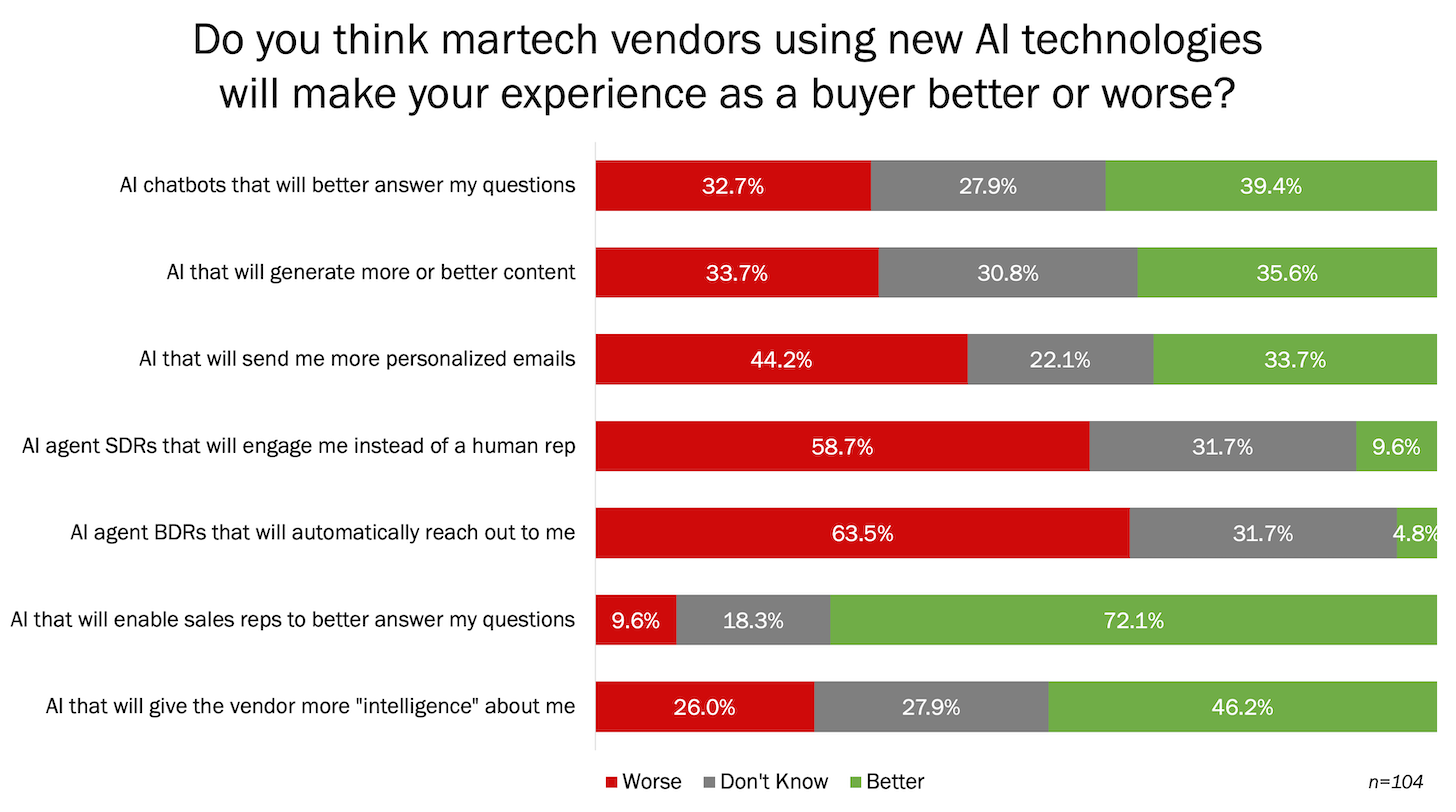
How do you know you’re at the peak of a Hype Cycle? When means outweigh ends.
Martech professionals and marketing ops leaders are being driven to apply AI in marketing — use it for something, anything! — with the belief that automating and accelerating things with AI, especially with generative AI, must produce beneficial outcomes. It reminds me of the old joke about the overly-optimistic kid excitedly digging through a giant pile of horse manure, “There must be a pony in here somewhere!”
The good news is that there are a massive number of things in marketing and sales that can be automated. Take any activity marketers or sales reps spend time doing — creating content, writing emails, calling prospects, answering buyer questions, researching new accounts or audience segments, etc. — and you’re pretty much guaranteed that there are ways AI could do more of that work for you. It will let you do more, faster and cheaper.
Will it be “better” though? Well, that depends on what — or who — you’re optimizing for.
Automating for the company vs. the customer?
6 years ago, in The New Rules of Marketing Technology & Operations, I shared the 2×2 below as a framework for evaluating automation in marketing. Is automation making things more efficient for the company or the customer? (That model was inspired from my own rather exasperating incident with a Taylor Swift concert that applied nearly every state-of-the-art marketing technology in ways that were maddeningly useless.)
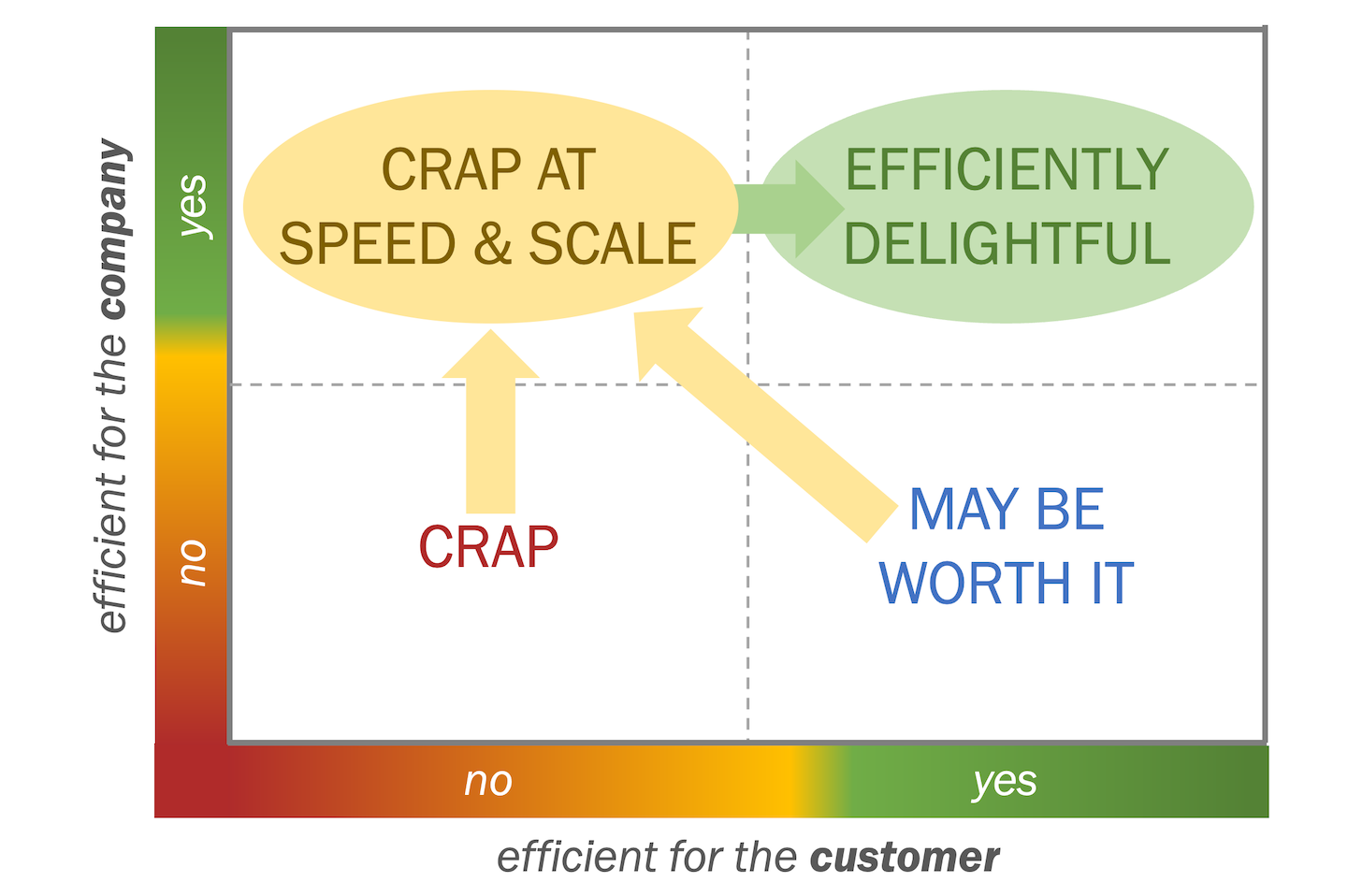
Processes that are inefficient for both the company and the customer are crap, while experiences that are efficient for both are awesome.
Some processes may be inefficient for the company, but efficient for the customer — say, escalating an individual customer’s issue or request to a senior manager to resolve. While it’s tempting to seek to make those more efficient for the company, be careful. Often, automating things in that quadrant can improve them from the company’s perspective, but actually make the experience worse for the customer.
Look no further than the last frustrating experience you had with an IVR, automated call center. Super efficient for the company. But for the customer? Well, if you’re remembering a frustrating experience, that answers the question. At least for you, in that situation, the tech wasn’t efficient for the customer.
“But AI promises to make experiences like automated call centers much better!” Yes, it does. And surely it will. (“Don’t call me Shirley.”) But the point is that not all automations are inherently better for the customer.
How will AI martech affect the buyer experience?
Which led me to run a survey asking martech and marketing ops pros how they thought different applications of AI in marketing and sales might make their experience as a buyer — not their own use as a seller — better or worse. The results at the top of this post are revealing.
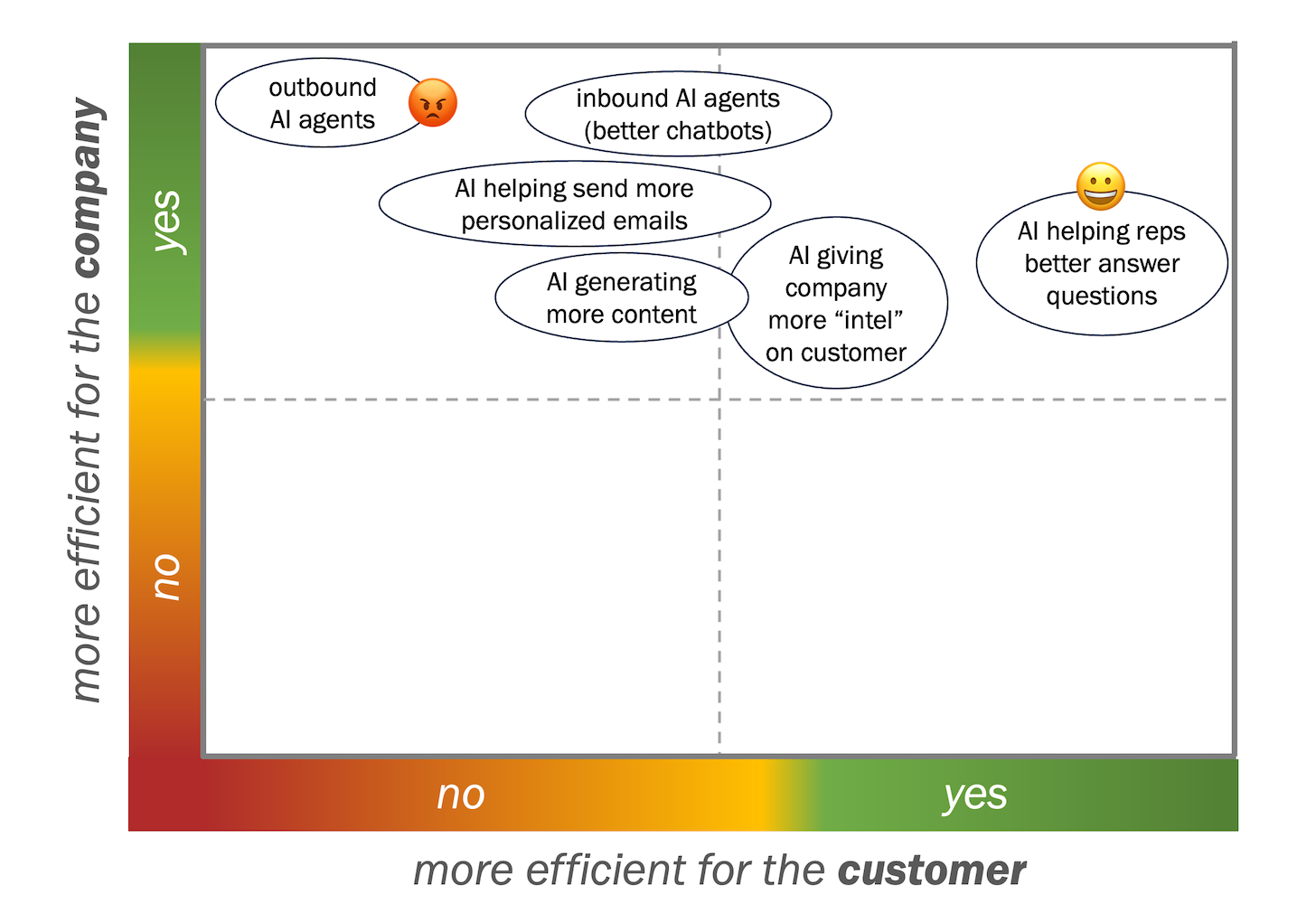
When it comes to using AI for better chatbots and creating more or better content, more respondents thought it would improve experiences rather than make them worse. Although the split was pretty close:

But when it comes to AI being used to drive the seller’s efficiency with automated sales engagements — from sending more personalized emails (because having your inbox flooded with highly personalized emails is so much better than having your inbox flooded with poorly personalized emails) to having AI agents serve as inbound SDRs and outbound BDRs — respondents showed far less enthusiasm:

There’s a whole wave of automated AI agent SDRs and BDRs hitting the market: 11x, Artisan, AiSDR, Qualified, Regie.ai, LeadSend, etc. From a technology perspective, they’re incredibly impressive. Early-stage SDR and BDR work is hard and, given the generally low conversion rate of cold-calls to closed-won customers, expensive and time-consuming. So, hey, if you could just have an army of inexpensive, tireless AI bots do much of that work for you, why wouldn’t you?
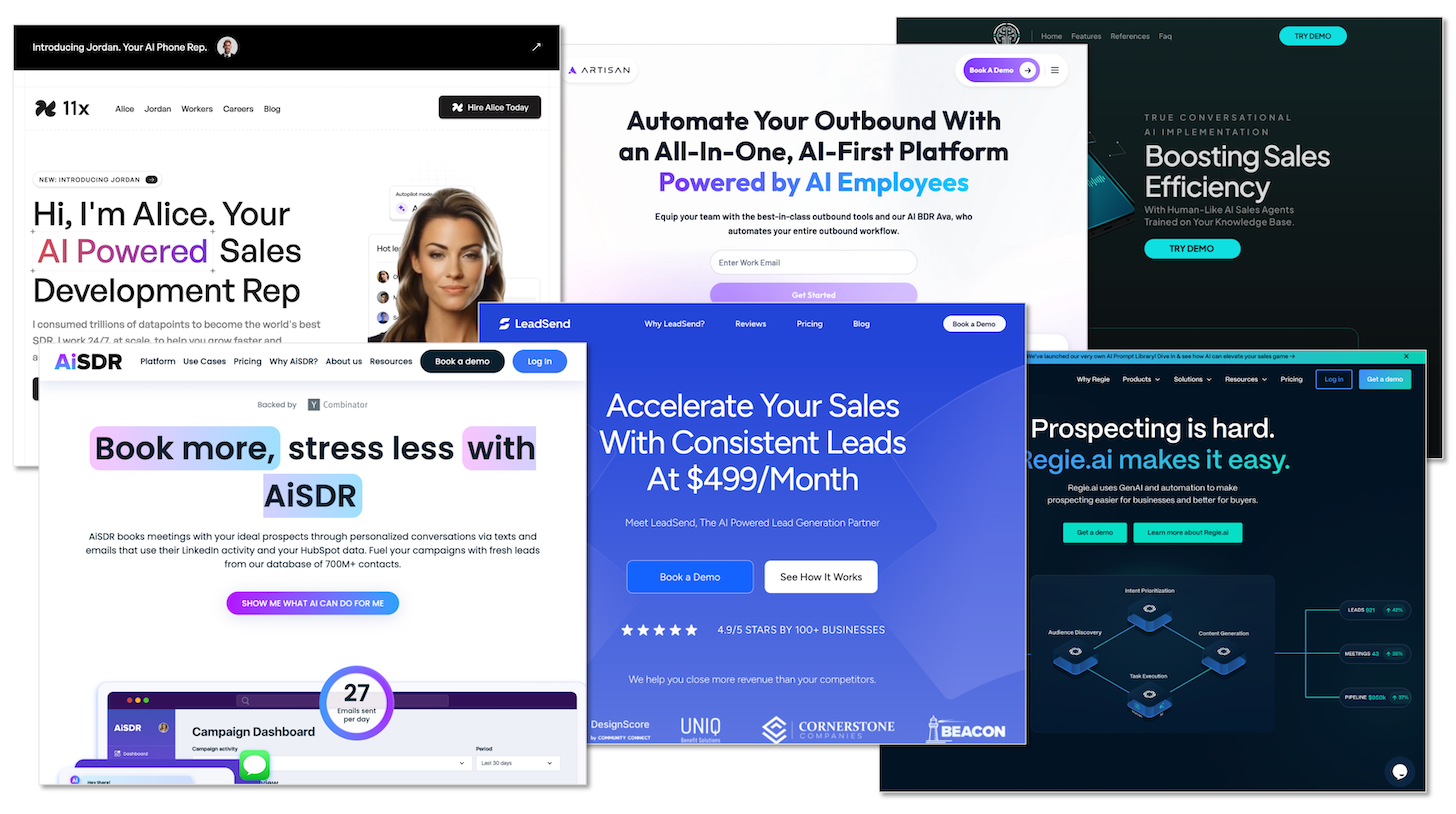
Well, given that 63.5% of the buyers on the receiving end of those outbound AI agent BDRs think it will make their experience worse (only 4.8% thought it might be better), you might pause to consider things from their point-of-view.
Are more prospecting calls, emails, and texts a good thing from the buyer’s perspective? I’d be generous if I said, “Not necessarily.” And when it becomes clear that the seller didn’t think it was worth any time from humans on their end to prospect you — while audaciously thinking it was fair to take your time as a human recipient — well, let’s just say that some reputational damage to the seller’s brand may be incurred.
Interestingly, the AI capabilities that martech buyers thought would most likely improve their experience was “AI that will enable sales reps to better answer my questions” — 72.1% of respondents said that would be a positive change:

It’s not that buyers don’t want to talk with sales reps. But they want to talk with them on their terms and on their timetable. And when buyers do reach out with questions, they want quick, accurate, thorough answers. They recognize that salespeople aren’t all-knowing oracles. But if sales reps could be supported with AI superpowers to answer more questions, more quickly, more accurately, and more thoroughly… that would be a better buying experience.
It’s also worth pointing out that “AI that will give the vendor more ‘intelligence’ about” me was ranked as the 2nd-most likely AI technology to improve the buyer’s experience. I was slightly surprised by this, given the continued clamor in government and the market for greater privacy regulations. Was my use of the word “intelligence” in quotes too subtle? Possibly. Or it may be that buyers interpret it as a path to quality-over-quantity in sales and marketing engagement.
“I don’t need more emails, calls, or texts from you. I need genuinely useful ones on the infrequent occasions when something is truly relevant to me.”
The unpleasant 2nd-order effects of AI in marketing
A year and a half ago, I wrote a post exploring the 2nd order effects of generative AI in marketing and martech. My thesis was that, hey, it’s great as a 1st-order effect that AI lets us create orders of magnitude more content — including personalized sales outreach. But the likely 2nd-order effect of increasing volume is that buyers will become even more overwhelmed and will increasingly tune out those channels, especially those “pushing” such content.
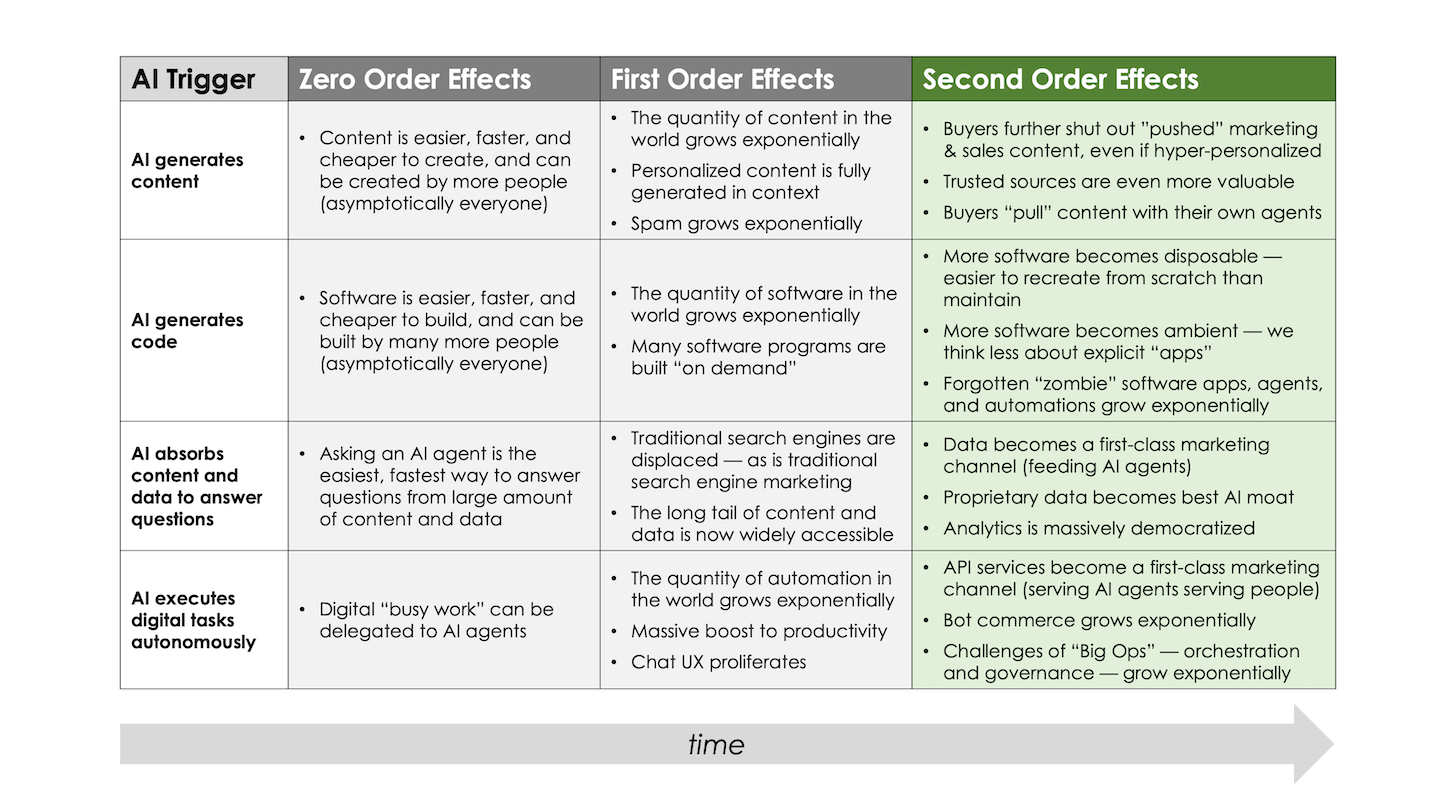
The responses from our survey of AI impact on the buyer’s experience indicates that those 2nd-order effects are increasingly a concern. In fact, I expect AI helping create more/better content and AI helping send more personalized emails will be viewed as less efficient for the customer over the next couple of years due to content and message flooding.
On the bright side though, I’m actually bullish that great inbound AI agents — chatbots or inbound SDR bots — will come to be seen as more efficient for the buyer too. Such agent technology is still maturing, but as it improves its ability to answer more questions quickly, accurately, and thoroughly, I think it will become a preferred channel for buyers to evaluate and engage with a vendor. Perhaps even eclipsing the website?
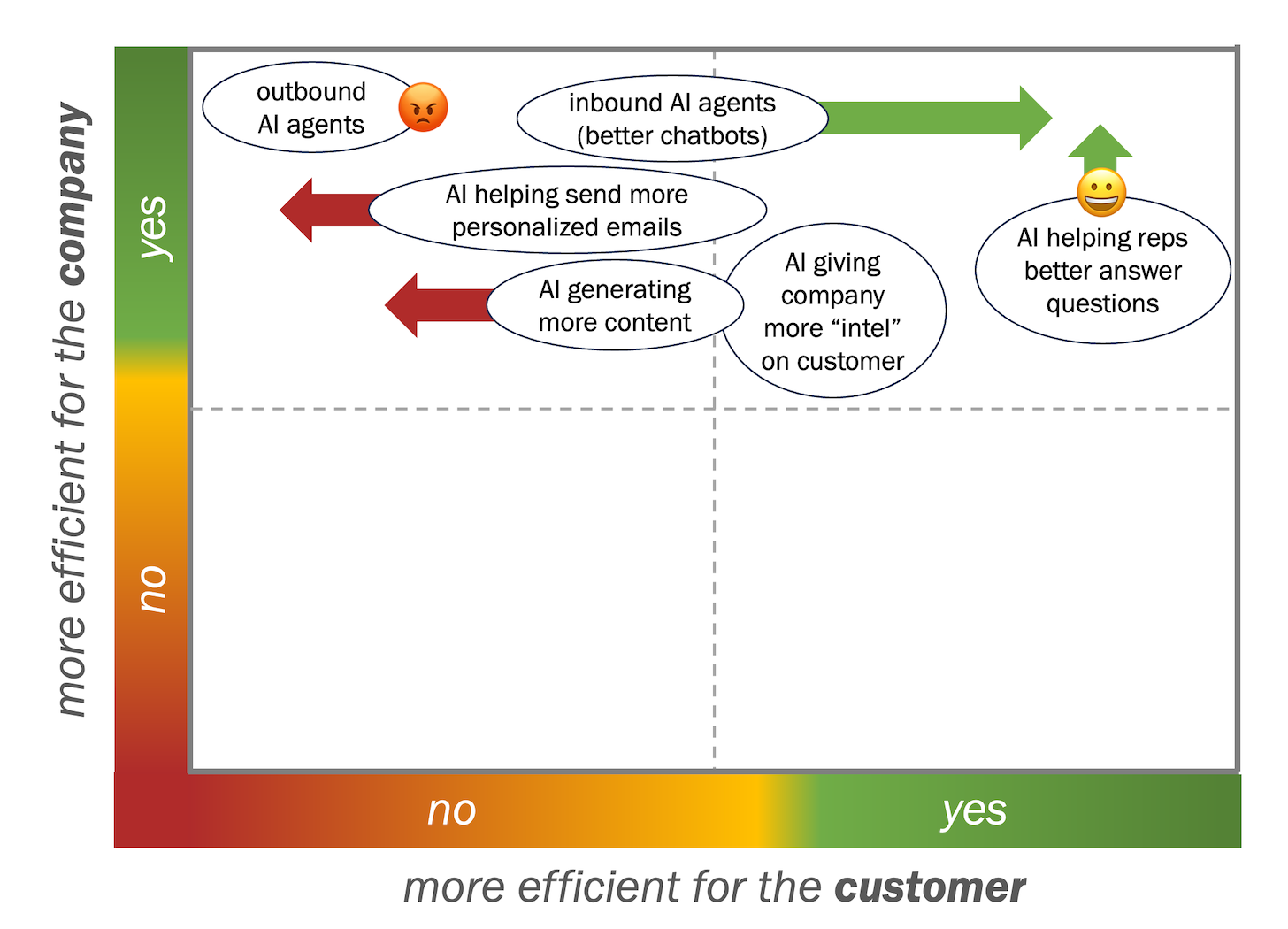
One of our jobs in marketing is to listen to the “voice of the customer” and champion the work necessary to serve them best. While there are lots of cool innovations popping up with AI across marketing and sales, the takeaway from this survey for me is that quality not quantity is what buyers seek most from us.
That may manifest itself best through innovative, AI-powered sales enablement.
Not a million bots, typing a million emails, however wonderfully personalized they are.
Get chiefmartec in your inbox
Join 42,000+ marketers and martech professionals who get my latest insights and analysis.